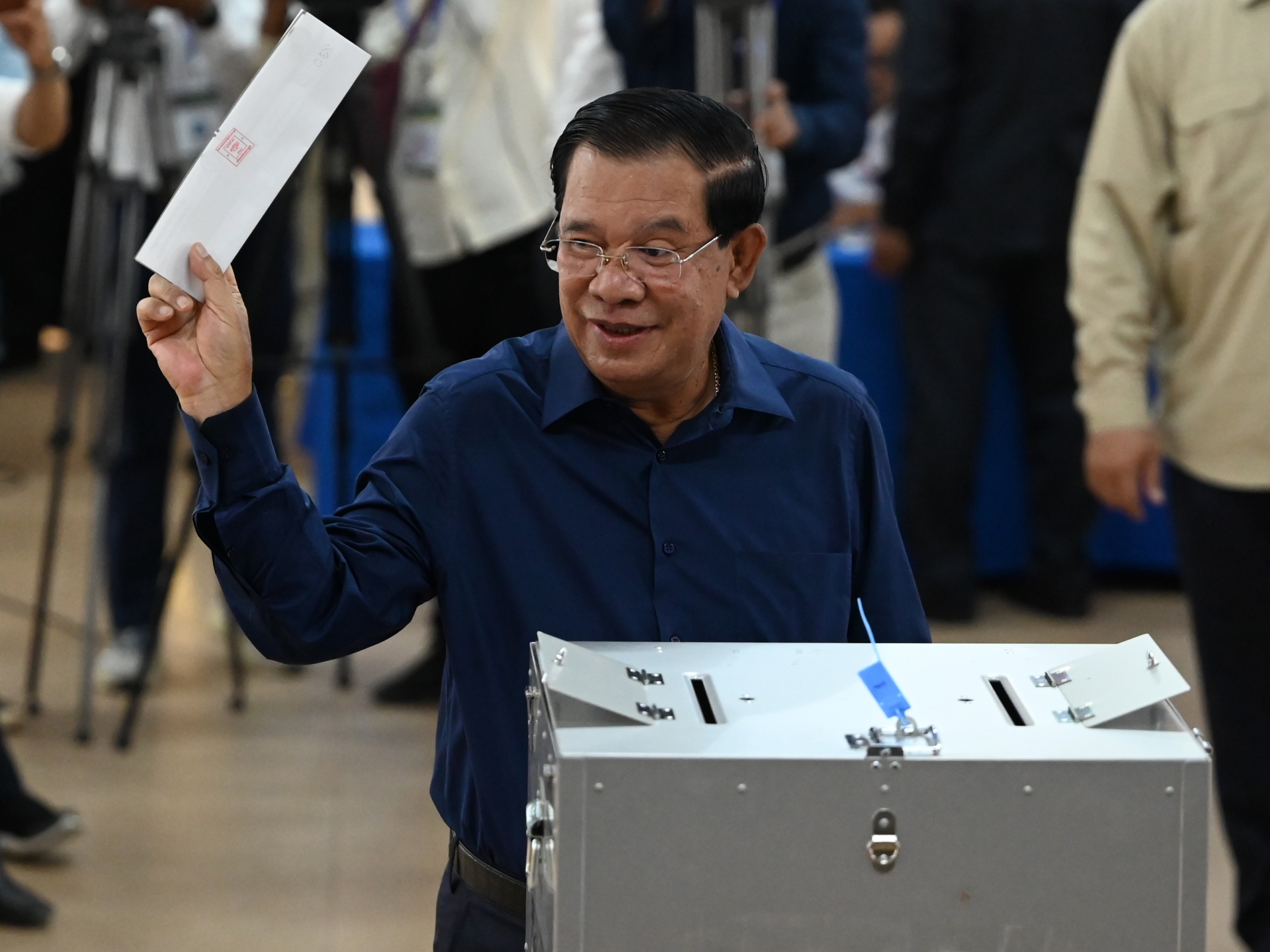News
Hun Sen’s party claims a win in the Cambodian election.

Phnom Penh, Cambodia – Voting is underway in Cambodia’s national elections, where it is expected that Prime Minister Hun Sen’s Cambodian People’s Party (CPP) will earn an easy victory in what critics see as the least accessible and fair election in decades.
Voting started at 7am (00:00 GMT) on Sunday for some 9.7 million people registered to vote in the country of approximately 16 million.
Alongside the incumbent and long-ruling CPP, 17 small parties also run in the election. However, no popular support exists to challenge Hun Sen’s decades of authoritarian leadership. His party is expected to keep all 125 seats in the country’s national assembly.
The only credible opposition challenger – the Candlelight Party – was disqualified from voting due to a registration technicality in May, which critics blasted as yet another example of Hun Sen’s flattening of democratic participation in the country.
Hun Sen and his wife, Bun Rany, cast their ballots shortly after polling stations opened in Takhmau, south of the capital, on Sunday morning, where one of the prime minister’s residences is located.
As the longest-serving elected leader in Asia, Hun Sen has consolidated power in Cambodia over the past 38 years. This election victory is expected to pave the way for him to transfer power to his son, Hun Manet, who is head of the Cambodian army.
Opponents and human rights groups have blasted the election due to the lack of credible competition and Hun Sen’s strongman tactics that have silenced all opposition to his rule.
Hun Sen’s party claims a win in the Cambodian election.
Opposition supporters were arrested in the run-up to the vote for allegedly encouraging the spoiling of ballot papers in protest of the one-horse election race. At the same time, internet service providers were ordered to block access to the websites of several independent news and information outlets.
‘Predictable outcome’
Ahead of voting, which runs through until 3pm local time (08:00 GMT) on Sunday, the International Federation for Human Rights (FIDH) said a “predictable outcome” from “an illegitimate process” could be expected.
The vote, FIDH said, is set to mirror the country’s last national election in 2018, when the then-popular Cambodia National Rescue Party was banned from political life, which allowed Hun Sen to win all seats in parliament.
As Hun Sen has focused on securing a succession of power to his son, Cambodia has seen a “disturbing uptick of human rights and election-related violations”, according to the organisation.
“The stage has been set for an illegitimate election,” FIDH said.
Voting started slowly in the capital, Phnom Penh but picked up pace later in the morning, though some residents said polling stations appeared quieter than in previous elections.
The National Election Committee (NEC) reported that almost 60 per cent of registered voters had cast ballots by 11am (04:00 GMT), and two people were arrested under laws recently passed to prevent people from spoiling their votes.
One of those arrested had drawn an “X” over their ballot paper and posted an image on social media. The second person had stuffed the ballot in their pocket to remove it from the voting station and discard it, NEC spokesperson Som Morida said.
Images of spoiled ballot papers were being shared on the Telegram messaging app and Facebook, Mu Sochua, an opposition leader living in exile, told Al Jazeera.
“I totally respect their courage. It’s an expression of anger, resentment, real defiance,” she said.
Mu Sochua also described the election in a separate interview with Al Jazeera as “theatre” and called on the international community to impose sanctions on Hun Sen and other members of the CPP.
Voter Tea Yumao, 50, said the election had gone more smoothly without the main opposition.
“Whenever there’s opposition, it’s messy, causing problems,” he said.
Hun Sen’s party claims a win in the Cambodian election.
A 37-year-old taxi driver said he “loved” Cambodia’s now-banned opposition party and its leaders but feared government repercussions if he did not vote. He added that he believed authorities had ways of discovering how people voted.
“I’m apprehensive about them saying they can see our vote afterwards,” he said shortly after casting his ballot.
“We know the situation. We know the truth. But we can’t speak,” he told Al Jazeera, requesting anonymity as he feared consequences for speaking with reporters.
Hun Sen succession
A 44-year-old voter in Phnom Penh, who asked that her name not be used to protect her identity, told Al Jazeera she was unhappy with the lack of competition in the election.
But she said she looked forward to Hun Sen stepping aside to allow his son, Hun Manet, to become prime minister.
“I only know that this year, it will be the son who takes over,” the woman said, adding that she hopes a new prime minister focuses on the economy and the poor.

Hun Manet, who graduated from the United States Military Academy at West Point and holds a PhD from a university in the United Kingdom, rose quickly through Cambodian military ranks and became army commander in 2018.
He is standing for election for the first time as a member of the national assembly.
While some see the power handover from father to son as possibly heralding a new start in Cambodia, others doubt that Hun Sen is ready to give up control entirely to his son.
Joshua Kurlantzick, a senior fellow for Southeast Asia at the US think tank the Council on Foreign Relations, said the planned succession was not universally supported in Cambodia’s power structures.
“Hun Manet is supposedly going to be Hun Sen’s successor, although pulling off a dynastic succession is not easy, and many powerful Cambodians are opposed to the move,” Kurlantzick wrote earlier this month.
Waiting outside a polling station in Phnom Penh’s Dangkao district, Mao Ny Sai said people know little about Hun Manet, and she has not heard him lay out plans for the country.
“There’s not much known about him,” the 52-year-old said of the likely future prime minister.
Click Button Below to Join Our Telegram Groups

For Advert Inquiries & News/Article Publishing
Call:+2348033888791, +2347069999005
E-mail: legalattorneyblog01@gmail.com









